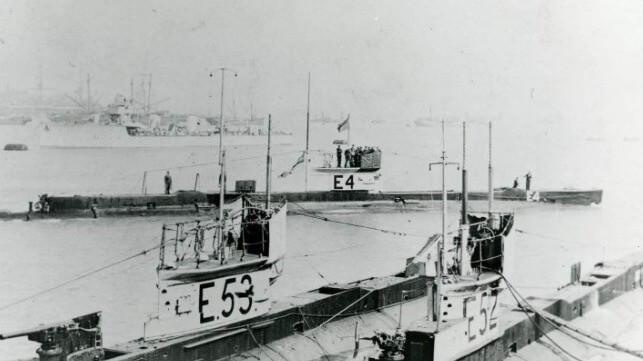Scientists Find Long-Buried Royal Navy Sub in Town Park

Two scientists believe they’ve confirmed a longstanding urban legend in Dartmouth, UK: a Royal Navy submarine is indeed buried in the town park.
Experts used ground penetrating radar to scan the site where the defunct boat was believed to rest. The site was backfilled with dirt long ago to create Coronation Park. The vague outline of what they believe be the submarine HMS E52 can be made out on the radar scans. It appears to be accompanied by a second object - a German torpedo boat, longer and narrower than E52.
The findings were made by archaeologist Dr. Simon Roffey and Dr David Ashby of University of Winchester. The two experts were intrigued by the recent research of Lieutenant Tom Kemp, who had determined the likely identity of the buried submarine that locals have talked about for years.
Lt. Kemp – a submariner who teaches navigation at nearby Britannia Royal Naval College – identified the craft as HMS E52 by looking through the archives. But for confirmation that there really was a sub under the park, radar was needed, and that is the area of expertise of Dr. Roffey and Dr. Ashby.
“It’s been my personal hobbyhorse for the better part of the past year,” said Lt. Kemp. “Confirming the final resting place of one of His Majesty’s submarines – and a pretty successful one at that – would serve to remind and reiterate that our naval heritage is all around us and can often be clawed back from obscurity. Our time and energy could scarcely be better spent.”
The park covers an area about the size of three football fields. Working with Lt. Kemp, the scientists focused on the corner of the park – close to a spot where canoes and dinghies are stored – thought to hide the submarine.
The radar scanned below the surface, but the results were nothing as clear and distinct as the outline of a submarine. But to the experts, the results suggest large metallic objects lying about six feet below the surface.
The team has concluded that E52 probably rests in the northeast corner of the park. At right angles to it is another large metallic object. This is most likely a German torpedo boat destroyer, which had also been purchased for scrapping after WWI.
The two radar signatures line up with an aerial photo of Dartmouth in the 1920s, which shows the submarine and another craft sitting on what had then been mudflats.
The team are seeking permission from the local authority to dig small bore holes in the park to hopefully identify a piece of equipment or metal unique to E52. This would provide more definitive proof of the truth of the legend.
No comments:
Post a Comment